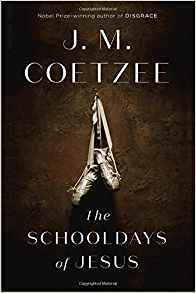 J.M. Coetzee, The Schooldays of Jesus (New York: Viking, 2016), 260pp.
J.M. Coetzee, The Schooldays of Jesus (New York: Viking, 2016), 260pp.
Set on a deserted island village called Estrella, Simón and Inés have their hands full with raising the precocious and recalcitrant six-year-old boy David. David doesn't map exactly with the Jesus of the New Testament, but he's an obvious doppelgänger of sorts. The young family lives like gypsies. They're on the run and are fearful of a census that could identify them. "Simón is not my real father," the young boy repeats, "and David is not my real name." He says that he wants to be a "lifesaver." When rebuked for his behavior, he asks, "what is filial obedience?"
Since a normal public school is out of the question, how shall they educate David? They decide on the Academy of Dance, a non-traditional setting, to say the least. Under the direction of Ana Magdalena, the children "dance down the numbers" from the heavens. The academy, she says, is "devoted to the training of the soul through music and dance."
Simón, "a sane, rational man," passionless, and who is described as "danceless," dismisses this sort of talk as meaningless bosh. And all the more so when a disheveled museum guard named Dmitri, with smelly clothes and oily hair, enters the story. But David likes the school, and so they all soldier on.
What interests Coetzee and drives this story is the development of the soul. For Simón, the school's educational philosophy raises intellectual conflicts between the rational and the spiritual, what you might call questions in his head. At one point, though, he asks himself, "when did his soul last dance?" In another moment of self-realization, he admits that "his soul aches with longing for it knows not what."
For the dark and troubled character Dmitri, the growth of his soul involves Dostoyevskian questions about love, passion, guilt, repentance, and forgiveness. For Dmitri, "the fault is not in my head, it's in my soul." He needs a priest with sacraments, if you will, not a psychiatrist with a bunch of pills. His dilemma is moral rather than intellectual. For everyone in this allegorical tale, the search for human meaning is both painful and profound.
Richard Poplak once described J.M. Coetzee (b. 1940) as "inarguably the most celebrated and decorated living English-language author." With over twenty books published, he's also prolific. His numerous awards include the 2003 Nobel Prize in Literature, and the Booker Prize twice (1983, 1999). This newest novel of his, which follows The Childhood of Jesus (2013), is also his fourth novel to be short- or long-listed for additional Bookers. Famously reclusive, the native South African moved to Australia when he retired in 2002.
For Coetzee's greater body of work, see the article by Colm Tóibín, "Shadows and Ghosts," NYRB (May 11, 2017).


